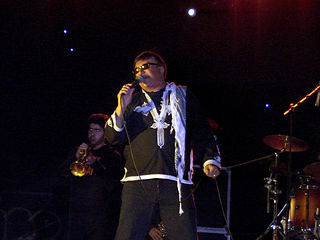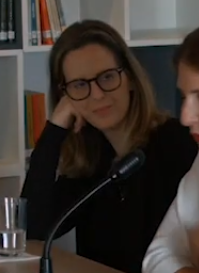Maria Adelaide Mengas Matafome Ferreira is a Portuguese singer.

Danielle Frida Hélène Boccara was a Moroccan-born French singer of Italian descent, who performed and recorded in a number of languages, including French, Spanish, English, Italian, German, Dutch and Russian.

Ângelo César do Rosário Firmino, better known by the stage name Boss AC is a Portuguese rapper originally from Cape Verde. The letters A and C, in Boss AC, come from the initials of his two names, Ângelo and César, respectively.
Gemini was a Portuguese band from the 1970s. The members were Fatima Padinha, Teresa Miguel, Tozé Brito and Mike Sergeant.

António Manuel Mateus Antunes, known professionally as Tony Carreira, is a Portuguese singer and musician. Born in the small rural locality of Armadouro, Pampilhosa da Serra, he moved to Paris at age 10 with his emigrant parents. He lived there for 20 years. Carreira has had several hits since 1991, becoming during the 2000s one of the most renowned and best-selling popular singers in his home country. Tony Carreira has performed sold out concerts in one of the largest venues in Portugal, the Pavilhão Atlântico in Lisbon, and also at the Olympia in Paris. His successful career largely overshadowed and was not affected at all by the fact that in the late 2010s he was involved in the most controversial plagiarism case in the Portuguese music scene ever.

José Albano Cid de Ferreira Tavares is a Portuguese singer, composer and record producer. Internationally, Cid is best known for his 1978 progressive rock album 10,000 Anos Depois Entre Vénus e Marte and for representing Portugal at the Eurovision Song Contest 1980 with the song "Um grande, grande amor".
"Manhã de Carnaval", often referred to as "Black Orpheus", is a song by Brazilian composer Luiz Bonfá and lyricist Antônio Maria.

Quinta do Bill is a Portuguese folk rock musical group from Tomar formed in 1987.

Wilson das Neves was a Brazilian percussionist and singer from Rio de Janeiro, Brazil. He was a key figure in the history of Brazilian music, having played with many of Brazil's greatest musicians across many decades and featured on numerous important recordings. Wilson was a very important artist specially for Brazilian popular music as a sambista, composer, and instrumentalist, with over 50 years dedicated to music. He can be heard in over 600 records from major Brazilian artists.

Paulo de Carvalho is a Portuguese singer.

Tonicha is a Portuguese pop-folk singer. She represented Portugal in the Eurovision Song Contest 1971, with the song "Menina do alto da serra" ; she finished ninth. She also represented her country in the OTI Festival 1972 in which she had better luck and finished sixth.
Nildo Parente was a Brazilian film actor. He appeared in 60 films between 1962 and 2010. Parente died on 31 January 2011, in Rio de Janeiro, due to a stroke.

Belchior was a Brazilian singer and composer. He was one of the first MPB singers from the Brazilian northeast to reach mainstream success, in the early 1970s.

Paulo Jorge do Carmo Brissos is a Portuguese singer.

Totalmente Demais is a Brazilian telenovela produced and broadcast by TV Globo, from 9 November 2015 to 30 May 2016.
Portugal was represented by Doce, with the song "Bem bom", at the 1982 Eurovision Song Contest, which took place in Harrogate on 24 April. Doce was the winner of the Portuguese national final for the contest, held on 6 March. The song was chosen through a national final organised by broadcaster RTP.

Tatiane "Tati" Bernardi Teixeira Pinto is a Brazilian short story writer, novelist, cronista, screenwriter and journalist. Her works are particularly directed towards young women.

José Mário Branco was a Portuguese singer-songwriter, actor, and record producer.

Negritude Júnior is a Brazilian pagode group from São Paulo, founded in 1986 in the suburb of Carapicuíba. Their biggest period of success came in the 1990s, where six of their albums had various hits on the record charts, with many albums reaching gold, platinum and double platinum status. The original line-up of the group included Netinho de Paula, Nenê, Wagninho, Claudinho, Feijão, Chambourcy, Ari, Lino, and Fabinho.














